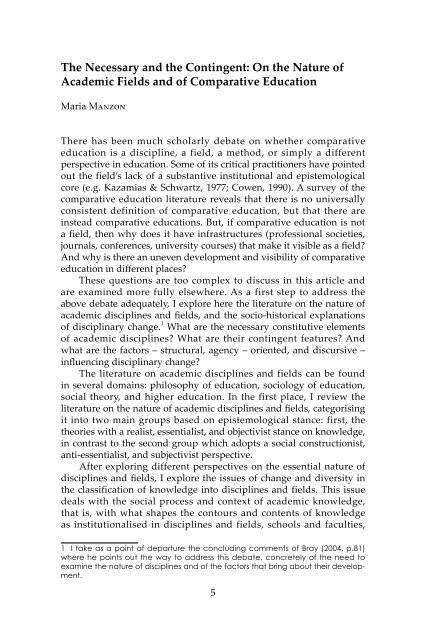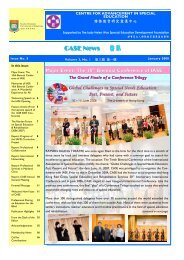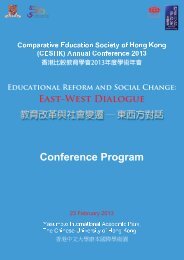Comparative Education Bulletin - Faculty of Education - The ...
Comparative Education Bulletin - Faculty of Education - The ...
Comparative Education Bulletin - Faculty of Education - The ...
You also want an ePaper? Increase the reach of your titles
YUMPU automatically turns print PDFs into web optimized ePapers that Google loves.
<strong>The</strong> Necessary and the Contingent: On the Nature <strong>of</strong><br />
Academic Fields and <strong>of</strong> <strong>Comparative</strong> <strong>Education</strong><br />
Maria Manzon<br />
<strong>The</strong>re has been much scholarly debate on whether comparative<br />
education is a discipline, a field, a method, or simply a different<br />
perspective in education. Some <strong>of</strong> its critical practitioners have pointed<br />
out the field’s lack <strong>of</strong> a substantive institutional and epistemological<br />
core (e.g. Kazamias & Schwartz, 1977; Cowen, 1990). A survey <strong>of</strong> the<br />
comparative education literature reveals that there is no universally<br />
consistent definition <strong>of</strong> comparative education, but that there are<br />
instead comparative educations. But, if comparative education is not<br />
a field, then why does it have infrastructures (pr<strong>of</strong>essional societies,<br />
journals, conferences, university courses) that make it visible as a field?<br />
And why is there an uneven development and visibility <strong>of</strong> comparative<br />
education in different places?<br />
<strong>The</strong>se questions are too complex to discuss in this article and<br />
are examined more fully elsewhere. As a first step to address the<br />
above debate adequately, I explore here the literature on the nature <strong>of</strong><br />
academic disciplines and fields, and the socio-historical explanations<br />
<strong>of</strong> disciplinary change. 1 What are the necessary constitutive elements<br />
<strong>of</strong> academic disciplines? What are their contingent features? And<br />
what are the factors – structural, agency – oriented, and discursive –<br />
influencing disciplinary change?<br />
<strong>The</strong> literature on academic disciplines and fields can be found<br />
in several domains: philosophy <strong>of</strong> education, sociology <strong>of</strong> education,<br />
social theory, and higher education. In the first place, I review the<br />
literature on the nature <strong>of</strong> academic disciplines and fields, categorising<br />
it into two main groups based on epistemological stance: first, the<br />
theories with a realist, essentialist, and objectivist stance on knowledge,<br />
in contrast to the second group which adopts a social constructionist,<br />
anti-essentialist, and subjectivist perspective.<br />
After exploring different perspectives on the essential nature <strong>of</strong><br />
disciplines and fields, I explore the issues <strong>of</strong> change and diversity in<br />
the classification <strong>of</strong> knowledge into disciplines and fields. This issue<br />
deals with the social process and context <strong>of</strong> academic knowledge,<br />
that is, with what shapes the contours and contents <strong>of</strong> knowledge<br />
as institutionalised in disciplines and fields, schools and faculties,<br />
I take as a point <strong>of</strong> departure the concluding comments <strong>of</strong> Bray (2004, p.8 )<br />
where he points out the way to address this debate, concretely <strong>of</strong> the need to<br />
examine the nature <strong>of</strong> disciplines and <strong>of</strong> the factors that bring about their development.<br />
5
















